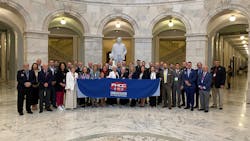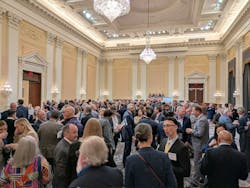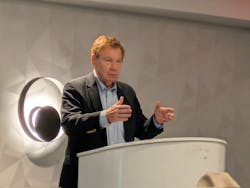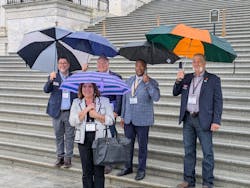WASHINGTON, DC — Over May 20th and 21st, 107 members of the Plumbing-Heating-Cooling Contractors - National Association gathered in the nation’s capital to share their top legislative concerns, then marched to the congressional office buildings to communicate those concerns with members of the House, Senate and their respective staff. To complicate matters, this conference took place against a backdrop of intense activity as the Congress continued negotiations over President Trump’s signature legislative package, the “One Big Beautiful Bill Act.”
The stakes for the conference were outlined by PHCC President Dan Callies in his introductory letter to the members, saying, “Our message to the new Congress and administration: plumbing and HVAC contractors protect the health and safety of the American people. We provide clean water and indoor air to ensure the comfort and well-being of our customers. We depend on a regulatory scheme that ensures we can do our job effectively, providing these essential services so Americans stay healthy.”
Marching Orders
Coordinating messaging for the conference was Mark Valentini, PHCC’s Vice President of Legislative Affairs. Valentini stressed the unique opportunity the conference presented: association members from around the nation would be (typically) visiting their own Representatives and Senators, allowing them to speak not as lobbyists, but as constituents.
Still, Valentini emphasized that the best way to get a message across to legislators was to keep that message simple and to keep repeating it. To that end he urged the assembled members to stick to the association’s talking points:
On energy policy, the PHCC wanted freedom of energy choice for its customers and was in support of Representative Nick Langworthy’s (R-NY) “The Energy Choice Act,” a bill that would prohibit any state or local regulation from banning an energy connection based on the type of fuel used.
While making it clear that the PHCC was in favor of both the EnergyStar and WaterSense programs, the association also wanted common-sense legislation that would allow working contractors to supply the equipment and systems that best suit their customers’ needs and budgets.
On tax policy, a top concern was certain tax provisions that were set to expire, which would result in automatic tax increases for many families and businesses. Key among those provisions, section 199A of the tax code (introduced in 2017), the so-called “pass-through” provision, which permits owners of sole proprietorships, S corporations, or partnerships to deduct up to 20% of the income earned by the business.
With PHCC representing so many family-owned businesses, the Estate Tax was an important topic (with the hope that it be reduced or eliminated) as was continuing with a low corporate tax rate (or lowering it still further). For contractors selling high-efficiency equipment, the preservation of credits or deductions surrounding energy efficient buildings (25C and 179D) was also a talking point.
On workforce development, the association and its members wanted to stress to legislators the desperate need for trained workers most contracting companies are experiencing, and the incredible opportunities there are for young people in the skilled trades; a four-year college is simply not everyone’s best path to prosperity.
To that end, the PHCC was strongly in favor of registered apprenticeship programs, and funding for those programs through the 2014 “Workforce Innovation and Opportunity Act.” Other important measures included expanding Pell Grants to include shorter-term, skills-based training, and re-working the 529 college savings program as a “career” savings program through the “Support the Freedom to Invest in Tomorrow’s Workforce Act.”
Valentini hoped the assembled association members would illustrate these talking points using their own stories—that they would talk about their own businesses and families and the challenges they were facing.
He also urged the group to keep to lobbyist best-practices: dress to impress; keep the focus on policy, not politics; and be polite to the staffers. “These young people,” Valentini said, “are remarkably well-informed, not just on how Congress works, but on our industry. And remember, the staffer of today could be the House Member or Senator of tomorrow.”
Lastly, he asked members to stick to the Three Bs: Be Brief, Be Brilliant, and Be Gone.
An Insider’s View
The keynote speaker for the conference was former US Congressman Tom Davis, (R-VA), who during his seven terms authored more than 100 bills that became law. Davis now works as a public speaker and is the co-author of The Partisan Divide: Congress in Crisis. His keynote presentation was sponsored by Bradford White.
Combining an encyclopedic knowledge of recent government history with self-deprecating humor, Davis discussed the current state of US politics. He said that much of the dysfunction in evidence in today’s politics is the result of the president’s party becoming an extension of the executive branch. What the framers of the Constitution designed to be a balance of power system instead looks more and more like a parliamentary system.
Political polarization, he agreed, was a driving force for this change. Yes, Davis said, gerrymandering—the manner in which House districts are drawn up—has a role to play. Another factor has been unexpected outcomes from the Voting Rights Act; when minorities are concentrated into certain districts, they tend to bleed out of the surrounding districts.
But there are simpler reasons behind polarization. People tend to self-sort—we simply like to live around people who share the same views as ourselves.
Exacerbating those natural tendencies has been changes in the way people consume media. Since the end of the Fairness Doctrine media and social media channels have proliferated at an astounding rate. There is no longer a single source for authoritative truth (with Walter Cronkite often held up as the last great example). Instead, people seek out news sources that affirm, rather than challenge their world views.
As a result, people now vote more for the political party they support than they do for the candidate.
Currently, Davis continued, the Republicans are in control of government. They have inherited a bad debt-to-GDP ratio. Right now, the US is spending more money on the interest on the national debt (14% of the budget) than we are on national defense.
The problem with the debt problem is, where do you cut? The Department Of Government Efficiency (DOGE) was looking for $1 trillion in cuts—but that kind of money, Davis said, is simply not to be found in government operations. It’s in things like Medicare, Medicaid and Social Security—all highly popular programs.
Looking at the midterm elections, the Democrats have the advantage in enthusiasm (the party out of power usually does, Davis said). Adding to Republican problems is that Trump voters are hard to get to the polls when Trump isn’t on the ballot. The big battle for power will be in the House, given that most Senate races are not competitive.
Davis concluded by saying that right now, government was a tough place to be, no matter what role you served in or what party you belonged to. “There are no easy choices.”
And Much More
Aside from the actual day of lobbying, the conference included two networking events. A Joint Advocacy Reception was held the first day in the Cannon Office Building where the PHCC was joined by members of the Air-Conditioning Heating and Refrigeration Institute (AHRI) and Heating Air-Conditioning & Refrigeration Distributors International (HARDI). Several members of Congress were in attendance.
On the last day of the conference, PHCC members gathered at the YOTL hotel for a closing reception, to share their lobbying experience and enjoy a few drinks before heading home.
Two informative panel discussions were held. The first, Tax Reform and the Impact on Plumbing and HVAC Contractors with panelists Palmer Schoening, M.P.P. (Chairman of the Family Business Coalition and President, Schoening Strategies LLC), Chuck White (Vice President – Regulatory Affairs PHCC-NA) and Robert Wolfer (Manager, Government Relations for Bradford White Corp.). The second, Advocacy Best Practices: Insights from Professional Lobbyists, with an introduction by Patrick Cunningham (National Account Executive, Federated Insurance) and a discussion with Craig Brightup (CEO, The Brightup Group LLC), John Boling (Director of Government Relations at the International Insititute of Building Enclosure Consultants) and Steve Rossi (Vice President of Advocacy at the American Supply Association).
Conference sponsors included Bradford White Corp., Federated Insurance and Scorpion.
About the Author
Steve Spaulding
Editor-in-Chief - CONTRACTOR
Steve Spaulding is Editor-in-Chief for CONTRACTOR Magazine. He has been with the magazine since 1996, and has contributed to Radiant Living, NATE Magazine, and other Endeavor Media properties.



